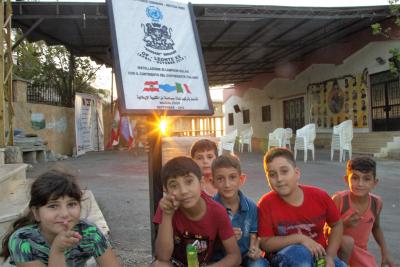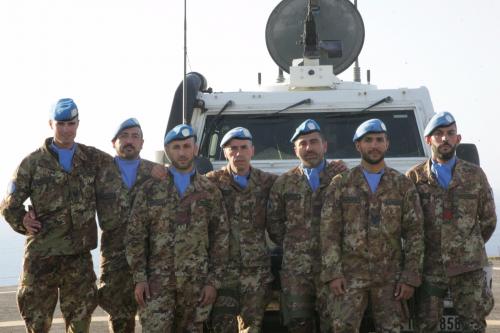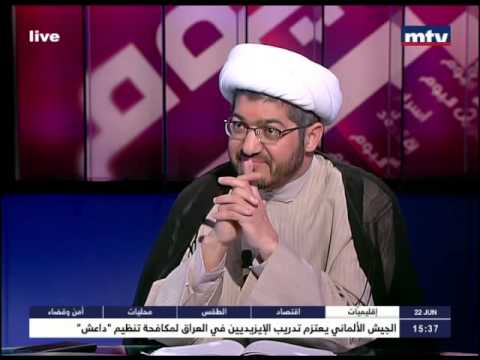Italy peacekeepers cohabit with Hezbollah in Lebanon

BEIRUT -- “One day history shall recall that men came from far away to bring peace and to protect our children.” Of course, the occasion is official and passionate speeches have to be sifted through diplomacy even here in Majdal Zoun, a tiny Shi’a enclave nestled on the coarse ascent rising from the shores of Tyre in South Lebanon, whose white rocky valleys and sparse Mediterranean scrubland is, along with some old signposts, a natural announcement of Palestine.
Sheikh Khalil Hamzam’s words are directed at a legation of the Italian peace-keeping contingent, praised for the latest gift to the community, eight solar street lamps that will shed light on the road linking the village with the maze of asphalt winding through the other centres in the region. The religious figure kindly tramples on the major during the ceremony, and his belonging to Hezbollah has to be inferred from the context — a wall where hangs a wide poster containing the close-ups of 26 Shiite fighters who were killed during the war in Syria, along which sit the rows of chairs occupied by a trans-generational male delegation of the village. A few yards away, across the street an old woman polishes a grave in the small, brand-new mausoleum erected for the recent ‘martyrs.’ It is the fourth donation Majdal Zoun has received in a year from the “Brigata Sassari,” whose six months deployment in Italy’s UNIFIL II mission Lebanon is about to end. The street lamps, a well for water, furniture and educational material for the local school, are duties to be paid for allowing the troops to patrol with their white UN armoured vehicles in the region south of the Litani river, observers say.
Ten years ago the abduction of two Israeli soldiers at the border triggered a ferocious response from Israel. South Lebanon was invaded and the country bombed from the air and sea. Thirty-four days of destruction and stubborn resistance, more than 1,300 deaths on the Lebanese side, mainly civilians, and 120 on the Israeli side, almost all of them soldiers. The result was more than three billion dollars’ worth of damage, and what Hezbollah said was a forcible retreat by the Israeli army forced for the first time in history — a “holy victory,” in the words of Party of God Secretary-general Hassan Nasrallah, that transformed Hezbollah from a guerrilla movement to a small regional power beloved in Lebanon and much of the Arab world.
The UNIFIL mission, deployed in the Lebanese South since Israel’s first invasion in 1978, saw its operations bolstered and widened to the delicate task of interposition, enhancing the social and economic reconstruction of the region and fostering dialogue between the sides. It is impossible to fully implement the UN resolution n° 1710 of August 2006. Israel constantly infringes the Lebanese border with its drones and F-16’s, while Hezbollah, originally from Iran but progressing via Syria, has refurbished its underground armory with thousands of missiles. There is no doubt, however, that when compared with Italian troops’ impact on the feudal world of Afghanistan and Iraq’s implosion, UNIFIL stands out as a major accomplishment. It is not just Shaikh Khalil’s hieratic diplomacy, but the children’s spontaneous smiles and greetings welcoming everywhere the Italian blue helmets’ passage.
“The July War has certainly stirred the region, demonstrating that a determined resistance can defeat one of the most powerful armies in the world” says Prof. Mosleh Saleh in a café a few hundred yards away from Hezbollah’s Executive Council office in Dahiyeh, Beirut’s populous Shi’a periphery. While the Party of God stunned Israel in 2006, climaxing guerrilla warfare waged since 1982, in the Anbar region al-Zarqawi’s al-Qaeda had just inaugurated the beheadings and turned the group’s name into “Islamic State in Iraq.” The calamitous, neocon-led American administration of Iraq, with its meticulous genius for economic and sectarian divisions was slowly, inexorably providing al-Zarqawi’s heirs with a mass base.
Today Hezbollah fights along the Assad regime in an attempt to preserve the “Axis of Resistance” established in the 1980s with Damascus and Teheran. Its soldiers and advisors are in Syria, Iraq, Yemen, the South and the Beqaa Valley. Some 50,000 men, according to the Lebanese Interior Minister, Nouhad Machnouk, constitute an “occupation force” in the country.
“Islamic State and al-Nusra were encircling Lebanon at the northern border, which is why Hezbollah intervened in 2013. If it had not, blood would have reached the streets of Beirut. Hezbollah has become the guardian of Lebanon, preventing anyone, both internally and abroad, to disrupt its fragile balance,” says Saleh, one of the many intellectuals counselling the party. The Lebanese army merely mans the entrance to Dahiyeh. Beyond the check points, amid the streets dotted with the portraits of Nasrallah, Khomeini, Khamenei, imam Musa al-Sadr and the new local martyrs, stands Hezbollah’s informal security apparatus, a knot of men chatting and puffing around water pipes, who can distinguish between a disoriented foreigner and an enemy. Several suicide and car bombs have rattled the Shi’a periphery since the party intervened in Syria.
In the face of weak and religiously divided army and police forces, heavily financed by the United States, the Lebanese parties have maintained their own discrete militias. The political scene remains divided along the coalitions born out of Prime Minister Rafik Hariri’s assassination in 2005. His son Saad leads the Mustaqbal party and the March 14 Coalition, including the Lebanese Forces of Samir Geagea, Gemayel’s Phalange and several other small Christian and Sunni movements. The Shi’a Amal and Hezbollah, the Christian Free Patriotic Movement of Michel Aoun, the Druze of Arsalan (and loosely Jumblatt) and the Marada Movement of Suleiman Tony Franjieh constitute the March 8 Coalition. In new fashion, the ghosts of the past still hover over the small country of cedars.
The Tai’if Accord in 1989 put an end to Lebanon’s 15-year-long civil war and founded the basis for the takeover of the confessional system distributing every position in the state according to religious identities, substantially diminishing the Christian role, which had been hegemonic since independence from France in 1943. With the progressive participation of Hezbollah to institutional politics, however, the Shi’a ex-proletarian masses, now a majority in the country, have entered both the parliament and the government. Since May 2014 the March 8 coalition has deserted all the parliamentary sessions that should have elected a successor to president Michel Suleiman. For two years the media have been populated by endless and unfruitful meetings, in pure beckettian style. Hezbollah has its candidate, Michel Aoun, the ex-maverick general of the civil war who backed the resistance during the 2006 war. Not even the March 14 proposal of Franjieh, close to the Syrian establishment, could distance the Party of God from its fraternal debt.
Everyone look northwards at Aleppo. A victory from the regime would definitely impose Bashar al-Asad as a cornerstone for the troubled future of Syria. Those rebellious forces which in 2011 perverted the uprising in the attempt to establish a Sunni-friendly, or, better, a Wahhabi-friendly republic, would lose their last urban stronghold and a chance to take part in any peace settlement. Aoun would, in this way, represent Lebanon in a regional balance where the project to overturn the governments of Iraq and Syria has failed, and the Shi’a axis, which has conquered al-Abadi’s government in Baghdad, stronger than before. Needless to say, being the president of the republic as well as the commander in chief of the army, Hezbollah’s resistance necessities would be secured for the next six, vital years. Time will tell whether this would mean a new, undisputed hegemony over Lebanon. Slowly, reluctantly, the March 14 coalition has opened to Aoun candidacy.
Meanwhile the municipal elections held in May have delivered a message of mounting impatience towards the establishment, with many independents (and women) elected in the old parties’ traditional fiefdoms. An epiphany that had already surfaced last year with the “You stink!” movement which gave political substance to a spontaneous protest against the government’s inability to solve the garbage issue, a clear condemnation of the corrupt, paralysed, inept ruling class populated by the old warlords transfigured after Ta’if in statist. It is highly unlikely that the old guard will allow the birth of a modern, transversal secular party expressing the post-confessional dreams of the young generation. It is also highly unlikely that the young generation will be able to dismiss its own sectarian belonging and gather the critical mass necessary for a quiet, democratic revolution. In the religiously connoted schools the study of history stops at 1943. The civil war is removed, buried under the neo-liberal age inaugurated by Hariri in 1992. An old tradition, in fact, going back to the good old days of “Switzerland of the Middle East.” The “Golden Age” of capitalism shimmered in Lebanon too, but failed to extend its light to the lower social strata, of which the Shi’as were the majority.
“Hezbollah succeeded in listening to the population’s material and spiritual needs. And it delivered victories, military and political,” says Sheikh Sadeq Naboulsi at the second floor of his office in Sidon. In an ample room, at the ground floor of the guarded building, mothers and kids stroll around the table where discounted scholastic material, books and dictionaries are displayed. “We gave our people the dignity that history had deprived them of,” continues the young sheikh, who is considered to belong to the future ruling cadres of the party. “Hezbollah is different. The Americans can freeze all our accounts,” he says referring to the strict sanctions applied by Washington in early 2016, “but, as secretary general Nasrallah has said, as long as Iran exists we will have money. And Iran will exist forever. Here in Lebanon we are trying to protect a frail democracy, and we will succeed, first of all participating as a protagonist at the settlement of the New Middle East, when the battle will be over.”
jp-nkd-lf




